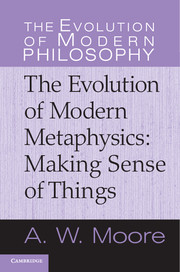Book contents
- Frontmatter
- Contents
- Preface
- Introduction
- Part One The Early Modern Period
- Part Two The Late Modern Period I
- Part Three The Late Modern Period II
- Chapter 15 Nietzsche
- Chapter 16 Bergson
- Chapter 17 Husserl
- Chapter 18 Heidegger
- Chapter 19 Collingwood
- Chapter 20 Derrida
- Chapter 21 Deleuze
- Conclusion
- Bibliography
- Index
Chapter 15 - Nietzsche
Sense Under Scrutiny Again
from Part Three - The Late Modern Period II
Published online by Cambridge University Press: 05 June 2012
- Frontmatter
- Contents
- Preface
- Introduction
- Part One The Early Modern Period
- Part Two The Late Modern Period I
- Part Three The Late Modern Period II
- Chapter 15 Nietzsche
- Chapter 16 Bergson
- Chapter 17 Husserl
- Chapter 18 Heidegger
- Chapter 19 Collingwood
- Chapter 20 Derrida
- Chapter 21 Deleuze
- Conclusion
- Bibliography
- Index
Summary
Introduction
Frege made linguistic sense an object of philosophical scrutiny and thereby both generated and shaped the whole of what followed in Part Two of this book. In the first sentence of Deleuze’s commentary on Nietzsche – the philosopher who initiates Part Three – he writes, ‘Nietzsche’s most general project is the introduction of the concepts of sense and value into philosophy’ (Deleuze (2006a), p. 1).
Frege and Nietzsche, in their interests and style, could hardly be less alike as philosophers. Even so, Deleuze highlights what is more than just a quirky point of comparison between them. Both, in their incommensurably different ways, made crucial contributions to establishing a due concern with sense as a linchpin of any attempt to make maximally general sense of things – and of any attempt to make sense of making maximally general sense of things. This is one respect of many in which Part Three of this book will run in parallel with Part Two.
- Type
- Chapter
- Information
- The Evolution of Modern MetaphysicsMaking Sense of Things, pp. 371 - 405Publisher: Cambridge University PressPrint publication year: 2011

